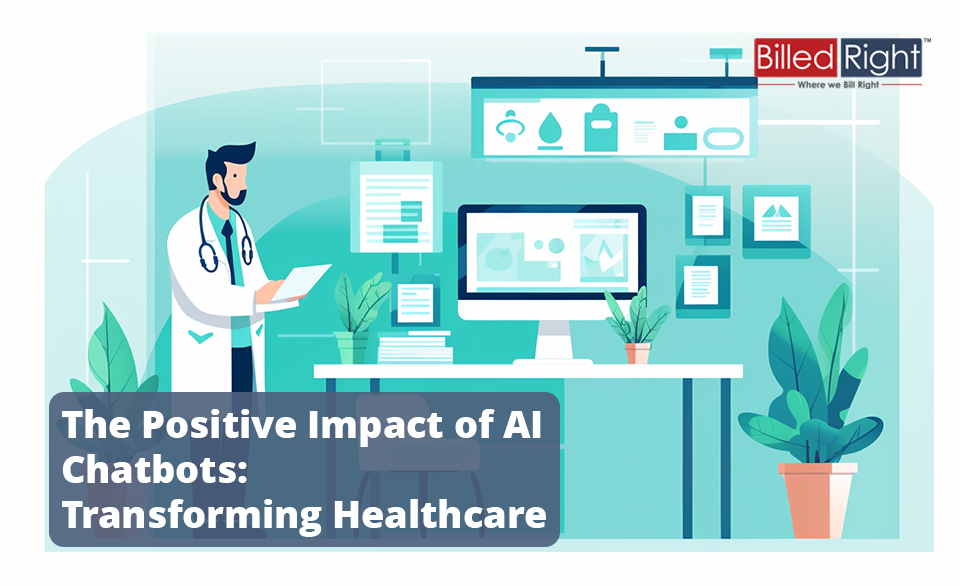The Positive Impact of AI Chatbots: Transforming Healthcare

In an era where technology continues to reshape the landscape of healthcare, the integration of Artificial Intelligence (AI) is proving to be a transformative force. At the forefront of this revolution are AI chatbots, versatile tools that hold the potential to redefine patient engagement, streamline administrative processes, and enhance the overall healthcare experience.
This blog series aims to dissect the multifaceted impact of AI chatbots in healthcare, beginning with a focus on their positive influence. We will then explore the drawbacks and practical implementation strategies of incorporating AI chatbots into your medical practice websites.
Join us on this journey as we unravel the potential of AI chatbots to revolutionize healthcare, with upcoming segments addressing the challenges and offering guidance on seamlessly integrating this technology into your medical practice’s digital ecosystem. Embrace the future of patient care and operational efficiency with AI chatbots at the forefront.
Enhanced Patient Engagement
Patient engagement stands as a cornerstone for delivering quality care. AI chatbots could play a pivotal role in transforming this engagement into a proactive and personalized experience. Here’s how:
- Instant Responses to Inquiries:
- Imagine a patient seeking information about practice hours or doctors’ availability. AI chatbots offer instant responses, delivering accurate and relevant information.
- This real-time interaction addresses patient queries promptly, contributing to a more informed and satisfied clientele.
- Efficiency in Appointment Scheduling:
- AI chatbots streamline the appointment scheduling process, allowing patients to book or reschedule appointments seamlessly.
- The convenience of 24/7 availability enhances patient access and reduces the burden on administrative staff.
- Time and Cost Savings:
- The efficiency gains achieved through AI chatbots translate into tangible time and cost savings for medical practices.
- Staff can focus on delivering high-quality care while the automated systems handle routine interactions, resulting in a more resource-efficient workflow.
24/7 Accessibility and Support
- Round-the-Clock Availability:
- AI chatbots provide a continuous, round-the-clock presence, ensuring that patients can access information and assistance whenever they need it.
- This 24/7 availability aligns with the modern, fast-paced lifestyle, offering convenience to patients who may seek guidance beyond traditional office hours.
- Instant Access to Information:
- Patients often have queries that don’t necessarily require the immediate attention of healthcare professionals. AI chatbots step in to provide instant access to general information, such as clinic hours, billing concerns, and other frequently asked questions.
- This instant access enhances patient satisfaction by providing timely and readily available support.
In embracing the 24/7 accessibility and support offered by AI chatbots, medical practices can enhance patient satisfaction and create a more streamlined and efficient operational environment.
Addressing Common Concerns: Privacy and Security
As we enter into the conversation of implementing AI chatbots within your healthcare practice, it’s crucial to address the valid concerns surrounding privacy and security. The seamless integration of these intelligent systems must prioritize safeguarding sensitive patient information. These are some concerns you should look out for:
- HIPAA Compliance:
- Healthcare practices must prioritize compliance with the Health Insurance Portability and Accountability Act (HIPAA). AI chatbots should adhere to HIPAA standards, ensuring the protection of patient health information (PHI) and maintaining the confidentiality and integrity of data.
- Regular Security Audits:
- Conduct regular security audits to identify and rectify vulnerabilities in the AI chatbot system. This proactive approach helps mitigate potential security risks and ensures continuous compliance with privacy standards.
- Anonymization of Data:
- Whenever possible, implement strategies for anonymizing data within the AI chatbot system. This adds an extra layer of protection, especially when using patient data for system improvement or analytics.
- User Education and Awareness:
- Educate both staff and patients about the security measures in place. Increased awareness contributes to a culture of vigilance, reducing the likelihood of inadvertent breaches.
Medical practices can confidently integrate AI chatbots into their digital ecosystem by proactively addressing these concerns and incorporating robust privacy and security measures.
Conclusion
AI Chatbots in Healthcare has been a very transformative development in the year 2023 and will be heavily implemented for years to come. It is crucial to learn about how it may benefit your practice and the potential drawbacks it may bring to your practice. Stay tuned as that blog post will be released within the next week. If you want to be notified about future healthcare insights, fill out the form below! Allow us to help you navigate your healthcare practices journey through education.







